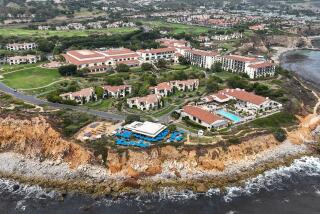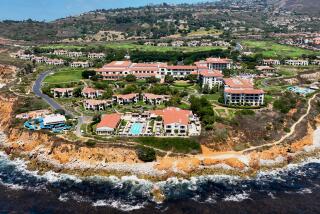White House Curbs Access of Former Clinton Staffer
- Share via
WASHINGTON — White House officials announced Friday they have found evidence that Mark Middleton, a former presidential aide, abused his White House access to impress business clients. He has been barred from entering the executive mansion without high-level approval, they said.
The decision came in response to indications that Middleton, a former aide to presidential advisor Thomas F. “Mack” McLarty, had flaunted his White House connections in an effort to become an international deal-maker.
Among other things, he is accused of using his White House business cards and keeping a voice-mail message on the White House telephone system long after he had left his job there. He also is accused of taking business clients to the White House dining room without authorization and portraying himself as someone with influence among President Clinton’s inner circle.
The announcement also reflected an effort on the part of the president to take affirmative steps in response to the burgeoning controversy over illegal and questionable fund-raising for the Democratic Party. While Middleton may prove to be little more than a bit player in the fund-raising saga, revelation of his actions caused the White House considerable embarrassment at a time when it is trying to fend off the scandal.
Before Middleton left the White House in February 1995, he was the chief aide to McLarty, who served initially as White House chief of staff and later as a senior presidential advisor. McLarty chose Middleton as his deputy after watching the young man work as a fund-raiser for Clinton in Arkansas in 1992.
Middleton, 32, a former Little Rock lawyer, also was a friend of Democratic fund-raiser John Huang, who was responsible for raising millions of dollars from Asian American sources--some of which has been returned by the Democratic Party because it was from illegal or questionable sources.
According to a political consultant in Taiwan, Middleton discussed the possibility of accepting an illegal $15-million contribution for the Democratic campaign from an official of the ruling Kuomintang, or Nationalist Party, in Taipei. Both he and Kuomintang officials have denied the allegation.
Middleton issued a statement Friday acknowledging that “questions have been raised about whether I misused access to the White House for personal gain. I categorically deny any implication that I acted improperly.”
Aides Raise Questions
Many of the questions about Middleton were raised by presidential aides who have spent the last week charting the former employee’s comings and goings at the White House in the nearly two years since he resigned.
The record they uncovered shows that Middleton entered the White House complex 65 times between February 1995 and last September and often roamed the premises and dined in the White House mess.
White House Press Secretary Mike McCurry said the record suggests that Middleton abused his access, even though his business activities apparently were not in violation of ethics rules restricting what former presidential appointees can do.
“If you’re a visitor to the White House, you’re not supposed to be roaming the building [and] you’re not supposed to go to the White House mess, except with a White House employee,” a White House official explained.
Approval Condition
McCurry said that White House employees have been told that Middleton will not be allowed to enter unless he has the approval of the chief of staff. Until now, Middleton, like any other former employee, has been able to enter the complex at the invitation of anyone who works at the executive mansion.
“The White House looks askance at anyone misrepresenting themselves as a representative of the White House,” McCurry emphasized.
According to White House records, Middleton saw the president on six of his visits to the White House since February 1995. On one occasion, he accompanied James Riady, scion of a wealthy Indonesian family and a close friend of the president. They engaged Clinton in a discussion of U.S. trade policy with China.
Before joining the administration as a Commerce Department official, Huang was employed by the Riadys’ Lippo Bank. Middleton apparently made the acquaintance of both Riady and Huang in Little Rock, where they worked for Worthen Bank in the mid-1980s.
On another occasion after leaving his government post, officials said, Middleton attended a presidential reception at the White House accompanied by Siti Hediati Harijadi, the daughter of President Suharto of Indonesia. According to Middleton’s lawyer, Robert Luskin, Middleton is trying to broker a business deal for Suharto’s daughter.
Records show that eight of Middleton’s post-employment visits were authorized by McLarty. But White House officials said that McLarty remembers only one such visit, on March 20, 1995, when Middleton brought his new employer, Steven Green, then-owner of Samsonite and other companies, to the White House.
But most of Middleton’s visits to the executive mansion were authorized by lower-level employees who were Middleton’s friends. It was on these visits that White House officials suspect he took advantage of his access to escort potential clients, such as Suharto’s daughter, through the hallways and to the dining room.
For his part, Middleton claims that most of his visits were personal. “I visited the White House often because that is where my friends worked,” he said in his statement.
Visits Explained
But he acknowledged that he was occasionally accompanied by business associates.
“On a few occasions--probably less than 10 in total--I also had breakfast or lunch in the White House mess, sometimes with persons who were friends or business associates of mine,” he said. “I took them there as a courtesy and as an act of friendship. I never discussed business, raised money or arranged meetings with any White House official in connection with any of these visits.
“I never implied in any fashion that I still held a position in the White House or that I had any special influence there; I do not believe that anyone ever understood my efforts to arrange a lunch or a tour as anything other than as the modest gestures that they were.”
McCurry said that Middleton’s voice-mail message recently was erased from the White House telephone system. Officials are trying to decide whether to establish a policy governing how long such messages can be retained after an employee leaves.
“There was no good reason for his voice mail to be active for more than a year,” McCurry said.
As McLarty’s deputy, Middleton was often present during his boss’s meetings with U.S. and foreign business executives, such as the Riadys. At Enron, a Houston-based energy company, for example, executives recalled that they often talked to Middleton when McLarty was unavailable and developed a friendship with him.
Luskin, Middleton’s lawyer, said that his client received an “ethics briefing” shortly after he resigned. He was reminded that federal law prohibits him from lobbying the government on any issue in which he had been “personally or substantially involved.”
Different Standard
But Middleton was not asked to adhere to the much tougher standard imposed on those designated “senior employees.” That standard would have barred him from lobbying the White House on any issue, officials said.
Middleton maintained his relationship with the Riadys and corporate executives, such as those at Enron, after leaving the White House.
Not long after he had left, Middleton established his own company, CommerceCorp International, with an office on Pennsylvania Avenue near the White House. He traveled abroad, looking for business opportunities.
“I am going to Asia, the Middle East and beyond,” Middleton told an Arkansas business publication in February 1995 as he embarked on an overseas tour. “I’m going out to meet people I have built relationships with.”
Middleton called on one of Riady’s business partners, Hashim Ning, in June 1995, while the elderly Indonesian was recovering from surgery. He brought with him a personal get-well letter from Clinton. After Ning died, his relatives contributed $450,000 last year to the Democratic Party.
On Friday, Middleton said that he was “not responsible in any way” for the contribution made by Ning’s relatives.
Middleton also went to Taiwan on Aug. 1, 1995. While there, according to a Taiwanese political consultant who said he was present, the former White House aide met with the chief financial officer of the Kuomintang and discussed a $15-million contribution--a discussion denied by both Middleton and the Kuomintang official. Such foreign contributions to U.S. campaigns are illegal.
Middleton’s accuser, C.P. Chen, said that Middleton also encouraged Kuomintang to hire him as its Washington lobbyist to provide a “direct channel” to Clinton. Middleton has denied making any such solicitations.
Amy Weiss Tobe, spokeswoman for the Democratic National Committee, said that Middleton was not authorized to raise funds for the Democrats.
However, White House officials confirmed that Middleton had been involved in raising money for the Clinton Birthplace Foundation, a group that intends to make a historic site out of the president’s childhood home in Hope, Ark.
In Taiwan, a businessman who also met with Middleton recalls that the young man was looking for a foreign business partner for Wal-Mart Stores Inc. and other U.S. firms. The businessman, who declined to be identified, said that he admonished Middleton about trying to use his official contacts to make deals.
As this businessman recalled their conversation: “I told him, ‘Mark, this is not the way to do business. You are too young. You’re using your position for business. But really you’re being used by others.’ ”
Luskin said that Middleton was not employed by the Riadys or the governments of Indonesia or Taiwan, even though he maintained close contact with them. Luskin declined to name any of Middleton’s business clients.
Times staff writers Maggie Farley in Taiwan and Richard Serrano in Little Rock, Ark., contributed to this story.
More to Read
Get the L.A. Times Politics newsletter
Deeply reported insights into legislation, politics and policy from Sacramento, Washington and beyond. In your inbox twice per week.
You may occasionally receive promotional content from the Los Angeles Times.










